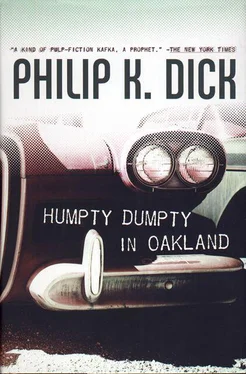In fact, he thought, Harman’s probably hiring and firing all day long.
Should I call the district attorney and report Harman as a crook? Or should I try to blackmail him for trying to swindle the old man? Or should I show up at his house or his place of business and try to talk him into hiring me? Or should I just go home and go to bed with my wife and get up the next morning and go to work at Al’s Motor Sales?
It was a hard question to answer. He could not make it out, try as he might.
What I need is a drink, he said to himself. Ahead the green and yellow lights of a bar could be seen, a bar he had never been to, but still a real bar, one that had a permit to sell wine and beer. So he parked the car and got out and crossed over to the other side of the street and went into the bar.
That whole argument really shook me, he said to himself as he pushed past people and up to the bartender to order his drink. Finding out about Harman swindling the old man, and then having him laugh at me and insult me because I told him the truth. Too much. That’s what I get for trying to wise him up, he realized. That’s my reward for breaking the news to him; he doesn’t want to hear it, so I get the blame.
“Hamm’s beer,” he said to the bartender.
Poor sick old nut, he thought. Wrapped up in his bathrobe and his slippers on his feet, watching TV for all he’s worth. What’s going to become of him? Maybe he’ll have a heart attack and die, or another heart attack. Maybe he’s dying now. Maybe he had a stroke and part of his brain isn’t functioning; it certainly could be that.
But he’s always been that way, Al realized. He’s no different, only more determined. The stupid old fart.
And then a terrible thought came to him, worse than any of the others. Suppose Mrs. Lane was just trying to keep me in the market, he thought. Trying to keep me from going into business with someone who already has all the real estate he can use; suppose what she said about Harman was just a sales pitch to keep me on the ropes.
That’s a really smart woman, he realized. She can wind me around her finger; it’s like having my mother after me, back in St. Helena. Maybe I’m wrong about Harman; maybe he isn’t trying to swindle the old man after all. My God, maybe I told the old man wrong. Maybe he’s right about me, me and my colored friends, and all the rest.
He drank his Hamm’s beer and ordered another. He stayed at the bar far into the late evening, drinking by himself, thinking it all over, admitting to himself again and again—it always seemed to be there—that he absolutely lacked the ability to see how things really stood. It seemed to be a major defect in him, and it continued to stare him in the face the more he thought about it. The defect did not go away; it was real. It was ruining his life.
And what could he do about it?
Several hours later he thought he had the answer. As best he could, he made his way across the bar to the phone booth. There he looked up Mrs. Lane’s home phone number, put in a dime and dialed.
When she answered, he said, “Hello, there. This is Mr. Chris Harman. Why are you telling lies about me? What do you have against me?” There was a lot more he had intended to say, but at that point Mrs. Lane interrupted him, more with a giggle than with her sentence.
“What you doing, Mr. Miller?” She went on giggling. “I know your voice; you can’t fool me. Sound like you out somewhere celebrating.”
“I wouldn’t swindle that old man,” he said. “He’s kept my cars running for years. You must be out of your mind. I ought to hire a lawyer and sue you. How’m I going to keep my cars running now that he’s selling his garage? You ought to feel sorry for me instead of persecuting me.”
“You mean Mr. Fergesson?” Mrs. Lane said. “You talking about him?”
“You’re against me,” Al said.
Mrs. Lane said, “I never heard anybody carry on so. Where you at?”
“I’m at the Forty-One Club,” he said, holding up the package of matches the bartender had given him. “On Grove Street. They cater to only the best of trade.”
Giggling, Mrs. Lane said, “You better go home, Mr. Miller. And let your wife put you to bed.”
“Why don’t you come down here and I’ll buy you a beer?” he said to Mrs. Lane. “Bring your husband if you have one. If you don’t, bring him anyhow.”
“You really crazy,” Mrs. Lane said. “You go home; you hear me? You go home.”
“I hear you,” he said. He hung up the phone, left the bar, looked around until he had found his car, got into it and went home.
The next day Jim Fergesson felt well enough and rested enough to dress and go down to the garage. He did not plan to do any heavy work; he intended to do only light stuff, and to be there to answer the phone when his customers called. He wanted to explain to them what had happened, his accident and what he intended to do.
The mailman appeared at nine o’clock, shortly after the old man had unlocked the big wooden doors. Among the usual ads and bills he found an odd-looking letter. It was in a personal stationery envelope; it did not look like a business letter. The name and address—his—had been written by means of an old typewriter; the letters were out of alignment, and partly red, and dirt-filled.
At his desk he opened the envelope. The letter inside had been written on the same old machine.
Dear Mr. Fergesson,
I understand you are thinking of going into a business situation with Mr. Christian Harman, the man who owns that record business up on the corner of 25th Street. Seeing as I am in a position to know about matters of that sort, I advise you that you better be careful as Mr. Harman is not reputable. I would sign my name to this only Mr. Harman is smart enough that he would sue me. However I do know about what I speak. Also, I am sorry that you have sold your garage.
There was no signature on the letter.
Did Al write this? the old man asked himself. He began to chuckle to himself as he reread the letter. It was the kind of gag that Al would think up; he could imagine Al tracking down an old typewriter, the older the better, the dirtier the keys the better, and then boning up in his mind as to how to phrase it, making it sound as unlike his usual style as possible. Making it sound like some ignorant Okie or possibly coon; yes, he thought—like some colored person.
On the other hand, he thought, maybe it wasn’t from Al; maybe all sorts of people knew about his going over to Marin County and having a look at Marin Country Gardens. The word had gotten around to the other merchants along San Pablo Avenue.
Thinking that, the old man felt angry. What business of theirs was it? Maybe they were jealous, he thought. Resentful that he was about to break away from this run-down district. Maybe it was Betty at the health food store. The more he thought about it, the more it seemed to him that this was exactly the sort of letter that old Betty, with her worries and fads, would write. I think I’ll go over there, he decided. And show it to her and get her to admit she wrote it.
Are they all talking about me? he wondered. Getting together and discussing me? God damn them, he thought. He felt anger at all of them, the whole bunch.
But suppose Betty hadn’t written it. If he showed it to her then, he would appear foolish. Better not to show it to anybody, even Al, just in case Al hadn’t written it either.
But then a new sensation came to him; it entered him so gradually that at first he did not notice it.
It pleased him to think that they were talking about him.
Sure they are, he decided. Word’s got around. Al spread the word. This letter proves it.
Things always got around fast along the street, from one store to the next. Rumor and gossip, about everybody’s business.
Читать дальше










